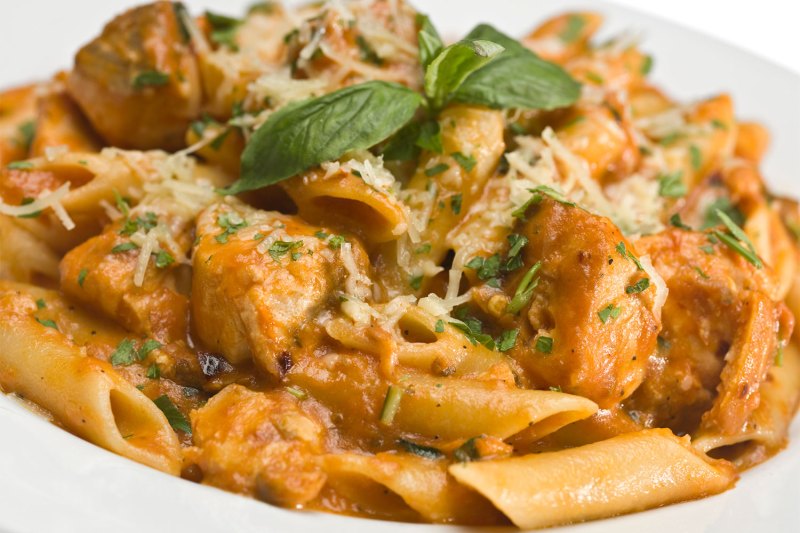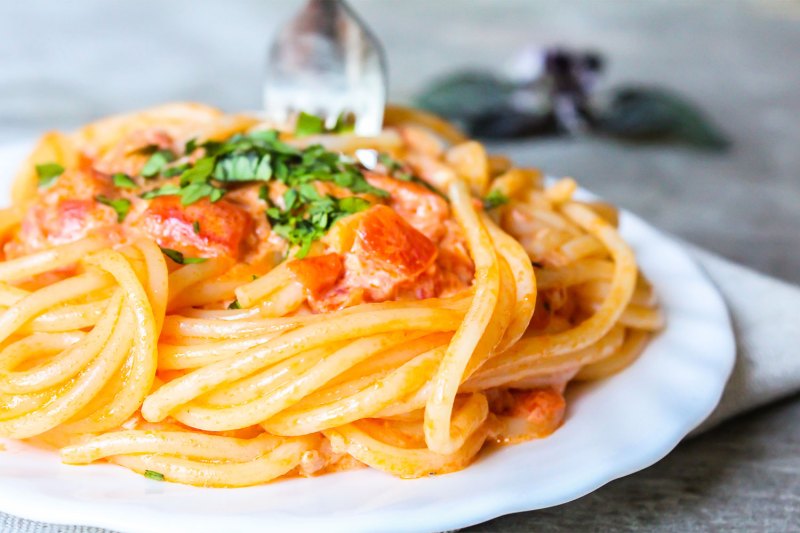A menu must-have at Italian (or, rather, Italian-American) restaurants in the United States, penne alla vodka consists of penne pasta tossed in a rich tomato cream sauce fortified with the dish’s eponymous spirit. It’s an indulgent crowdpleaser, but vodka sauce can also inspire some confusion, largely due to the fact that it’s named for a type of liquor famous for its flavor neutrality. If vodka doesn’t have much taste-related personality, then what does it really contribute to vodka sauce?
We asked professional chefs and culinary pros to offer their insight about vodka’s place in vodka sauce, and they gave us a full overview of the role played by this ingredient and whether it’s possible to make a vodka sauce-esque alternative that doesn’t include liquor.
Vodka doesn’t have a powerful flavor on its own, but it refines and highlights the sauce’s other flavors.
“Vodka may not have any strong taste, but it helps to enhance the overall taste of the meal,” explains recipe developer and blogger Chris Riley of The Daring Kitchen. As far as specifics go, Riley tells us that “adding a bit of vodka can bring out some flavor compounds in tomatoes that are only soluble in alcohol. [Vodka] pulls out [some] additional flavors and concentrates others without adding a flavor of its own.”

Executive chef and co-founder Justine Kelly of Sun Basket points out that some vodkas have more “presence” than others, which should be taken into consideration when selecting a bottle to use for vodka sauce: “Some vodkas do have a little more depth, like potato vodka, but the main purpose of the vodka [in vodka sauce] is to act as a slight ‘heat’ counterpoint to the sweet, tart tomatoes and richness of the cream.”
Vodka can also serve as an emulsifier, improving the sauce’s texture.
When used in the context of a tomato sauce, vodka influences both the taste and the consistency of the finished product, according to Frank Proto, the director of culinary operations for the Institute of Culinary Education in New York City. “[Vodka] acts as an emulsifier and keeps the tomato and cream from breaking apart, resulting in a creamy sauce,” Proto states.
It’s possible to sub in other spirits for vodka, as long as you take those flavors into account.
If you find yourself fresh out of Tito’s or Smirnoff and don’t want to change your dinner plans, you can trade in a different high-proof spirit … as long as you act judiciously. Chef, cookbook author, and recipe developer Suzannah Gerber of Plant Based Gourmet says that “at low concentrations (under 2% of total sauce by volume), vodka, or any high-ABV distilled spirit, will increase aromatics and aeration for the distribution of those aromatics. Higher than that and you taste the spirit itself, but the ‘sweet spot’ opens up the nose of the savory herbs and adds [a sense of] lift through the cooking to the heavy cream and thick tomato in this pasta sauce. So vodka itself isn’t essential, but the ABV is. [However, including] other spirits, such as non-neutral [liquors], will add new flavors rather than boosting the flavors [already present].” So go ahead and use a glug of gin in lieu of vodka — that is, if you’re a fan of juniper essence in your cream-based tomato sauce.
Using flavored vodka will amp up the flavor quotient of the sauce.
In some cases, a not-quite-neutral spirit can add intriguing flavor complexity to a more run-of-the-mill vodka sauce. Executive chef Bryan Rhodes of 619 Spirits Distillery and Tasting Room in San Diego argues that the use of regular vodka “is a holdover from when cooks used to drink in the kitchen, and it was just something easily on-hand to us for deglazing. However, if you are using flavored vodka (like 619 Scorpion Pepper Vodka), the pepper will stay behind and add spice to the sauce. We [also] do this with our buffalo sauce for our wings.”

If you’d prefer to avoid using alcohol in your sauce, try water with lemon.
So now we understand the value of vodka (or other spirits) in this sauce … but what if you want to make a completely alcohol-free version? Nutrition coach Elliott Reimers of Rave Reviews claims that it’s possible, and can in fact be achieved without noticeably sacrificing taste or texture. Vodka does not need to be in vodka sauce; a simple replacement is some fresh water and a squeeze of lemon. Not only is this an easy replacement, but it also is very cost effective if you are looking to save some money,” Reimers suggests.
Ready to make your own vodka sauce? Try this flavorful but entry-level recipe.
Easy Vodka Sauce
(By Matt Moore, chef and author of Serial Griller)
Nashville-based chef and cookbook author Matt Moore uses a simple but effective recipe for his vodka sauce, telling The Manual that “I’m always finding a way to sneak spirits into my food. [In the case of] Italian vodka sauce, the vodka adds a piquant note of heat and spice that blends nicely with the classic tomato and cream. Other spirits like bourbon and scotch are noticeably more powerful, whereas vodka provides just a slight enhancement to the flavor.”
Ingredients:
- 1 stick unsalted butter
- 1 yellow sweet onion, finely diced
- 2 cloves garlic
- 1 cup vodka (Moore prefers Dixie Black Pepper Vodka)
- 1 28 oz can crushed San Marzano tomatoes
- 1 pint heavy cream
- Cooked pasta (to serve)
- Parmigiano Reggiano cheese, grated (to serve)
Method:
- In a Dutch oven, melt butter over medium heat until it foams. Add onion and sauté until softened and translucent, stirring on occasion, for 6 – 8 minutes. Add garlic and cook, stirring for 90 seconds.
- Add vodka and simmer for 10 minutes. Finish by adding tomatoes and cooking on a simmer for 30 minutes.
- Add cream, reduce heat to low, stir and simmer for 15 – 20 minutes.
- Serve the finished sauce with hot pasta and grated cheese to taste.



